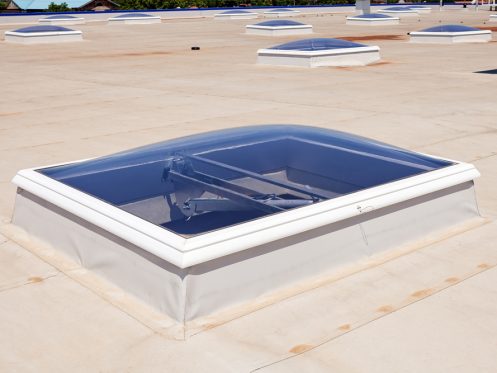Commercial roofing systems can be structured in many different ways, with each one fitting building’s needs and the owner’s budget. The type of roofing material you install on your commercial property plays an important role in its overall health, and it will determine the lifespan of the entire roofing system. Other factors (such as the surrounding environment, weather changes, animals, and foliage) can also affect your roof’s integrity over time. To get a better understanding of what’s needed to build a quality commercial roof, here is a comparison of some of the common materials that are involved in their construction.
Common Materials Used For Commercial Roofing
Most commercial roofing systems are either flat or low slope, which narrows the list to certain types of roofing materials. Some of the most common types of commercial roofing materials include:
- Built-Up Roofing Membrane — This is your basic “tar and gravel” roof. It’s made up of multiple layers (called “plies”) that create a flexible membrane, and it can vary according to the needs of the building as well as the budget of the owner. It’s a very old method of building flat or low-slope roofing, and it’s one of the most cost-effective ways to build a durable commercial roof that can last for many years.
- Metal Roofing — This is one of the most popular commercial roofing types because there are a lot of options when it comes to both materials and overall style. You can choose from galvanized steel and aluminum to copper and other aggregates of zinc, aluminum, or silicon-coated steel. Because metal roofing materials are prone to rust, protective surface layers are added so they can withstand prolonged exposure to sunlight and other environmental hazards. Metal roofing can also have a stylish and attractive look. But if budget and durability are more important, it’s better to go with an option that works best than what looks best.
- Modified Bitumen Roofing — This type of commercial roofing is made of reinforced fabrics that act as “carriers” for the bitumen, which is cut and installed in layers that are similar to what you’ll find in a built-up roofing system. These commercial roofing materials are usually installed in a two-ply system, which is attached to the roof deck with an adhesive. All you need to keep this roof maintained are annual inspections and regular cleaning, and it can give you more tensile strength than many other commercial roofing types that experience a great deal of foot traffic. If you expect to see a great deal of activity on your roof, modified bitumen might be an ideal choice.
- Thermoset Roof Membrane — Also known as EPDM, this type of commercial roofing system can give you a good mix of durability and versatility, which is paired with simple installation and easy maintenance. EPDM is resistant to ultraviolet light and ozone, which is achieved through a single-ply rubber material. It’s also impervious to colder temperatures and is resistant to some acids, solvents, and alcohol.
- Thermoplastic Roof Membrane — Thermoplastic Polyolefin (TPO) and Poly-Vinyl Chloride (PVC) roofing systems are both light in weight and highly reflective. They can also give you more resistance to weather, ultraviolet light, punctures, and tears, as well as most chemicals (including oils, animal fats, and bacterial growth). The seam strength of these commercial roofing types makes them great for second-generation applications. And because of their resistance to the items mentioned above, they’re commonly installed in restaurants and other businesses that release oils and fats from their ventilation systems.
- Green Roofing — This type of commercial roofing is one of the most versatile on the market today. Not only has it seen a recent increase in popularity, but it can also give you a sustainable way to build a roof for your commercial property. The biggest advantage of green roofing is that it can protect commercial properties from the elements while also managing water, drainage, and energy consumption. It’s one of the most beautiful commercial roofing types, and it can give you sustainable and environmentally friendly commercial property.
If you need someone qualified for commercial roofing, Bayfront Roofing and Construction has a team of experts that can help you. We’re roofers in Corpus Christi that can not only give you a sustainable roof that will last for years, but we’ll also make sure you’re completely satisfied when the work is complete. For more information about how we can help you with your next commercial roofing replacement, be sure to get in touch with us. We would be happy to speak with you!
